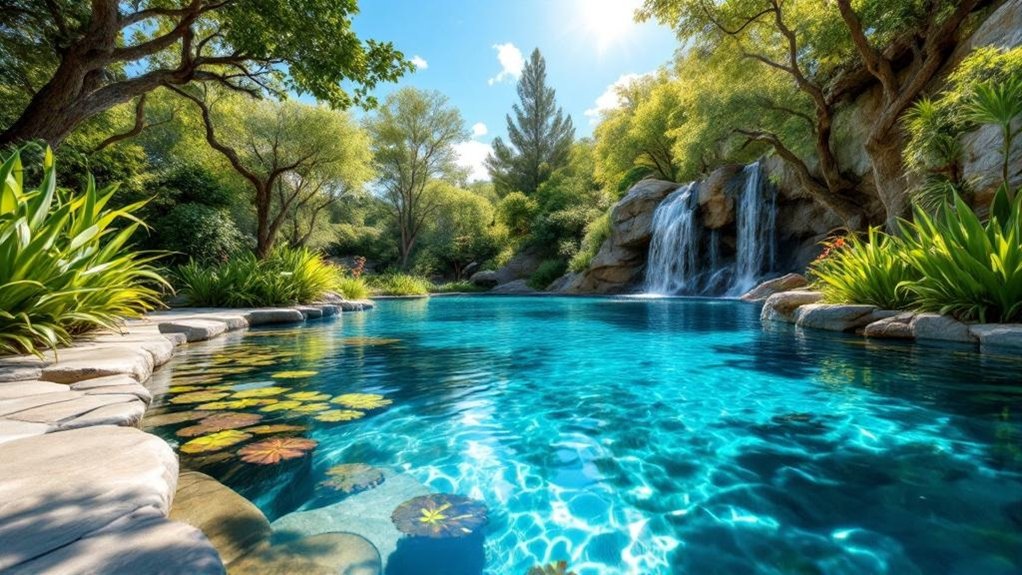Innovative heat pumps are transforming the landscape of sustainable pool designs. These systems utilize ambient heat, offering a more energy-efficient alternative for water heating. As pool owners increasingly seek eco-friendly solutions, understanding the nuances of heat pump technology becomes essential. The implications of this shift extend beyond mere convenience. What are the specific benefits and considerations associated with these advanced heating systems?
Understanding Heat Pump Technology
As the demand for energy-efficient solutions increases, understanding heat pump technology becomes essential for modern pool designs. Heat pumps operate by transferring heat from the environment, whether air or water, to maintain desired water temperatures. This process relies on a refrigerant that circulates through the system, absorbing heat and releasing it into the pool. Unlike traditional heaters that generate heat directly, heat pumps use electricity to move heat, making them more sustainable. Their efficiency is measured by the coefficient of performance (COP), indicating how much heat is produced per unit of energy consumed. Additionally, the technology can work effectively in various climates, providing reliable heating solutions while minimizing energy costs and environmental impact, thereby aligning with contemporary sustainability goals in pool construction.
Benefits of Using Heat Pumps for Pools
Heat pumps offer numerous advantages for pool owners seeking efficient and cost-effective heating solutions. To begin with, they utilize renewable energy, drawing heat from the environment, which notably reduces energy consumption compared to traditional heating methods. This efficiency translates into lower utility bills, making heat pumps an economically sound choice over time. Additionally, heat pumps provide consistent heating, maintaining comfortable water temperatures regardless of external weather conditions. Their durability and long lifespan further enhance their appeal, reducing the need for frequent replacements and maintenance. Furthermore, the environmental benefits are considerable, as heat pumps produce fewer greenhouse gas emissions than conventional heaters. Overall, the integration of heat pumps in pool designs contributes to sustainable practices while ensuring peak user comfort. Regular maintenance of equipment, including heater fan motor maintenance, is essential to maximize the benefits of heat pumps.
Types of Heat Pumps for Sustainable Pool Heating
When considering sustainable pool heating solutions, various types of heat pumps stand out for their efficiency and eco-friendliness. Air-source heat pumps, which extract heat from the ambient air, are popular for their affordability and ease of installation. Ground-source heat pumps, or geothermal systems, utilize the stable temperature of the ground, offering superior efficiency but requiring more extensive installation. Water-source heat pumps are another option, drawing heat from nearby water bodies, making them suitable for locations with access to lakes or rivers. Each type of heat pump provides unique advantages, allowing pool owners to select the most appropriate system based on their specific environmental conditions and budget. Overall, these heat pumps contribute considerably to sustainable pool heating practices.
How Heat Pumps Contribute to Energy Efficiency
Numerous studies indicate that heat pumps markedly enhance energy efficiency in pool heating systems. By utilizing ambient air or ground heat, these systems transfer thermal energy rather than generating it through combustion, resulting in lower energy consumption. This method enables heat pumps to operate at a coefficient of performance (COP) often exceeding 3, meaning they can produce three times more heat energy than the electrical energy consumed. Furthermore, the integration of heat pumps with renewable energy sources, such as solar panels, further optimizes efficiency, reducing reliance on non-renewable energy. Consequently, heat pumps not only lower operational costs for pool owners but also contribute to a reduction in greenhouse gas emissions, aligning with broader sustainability goals in the area of pool design and maintenance.
Considerations for Choosing the Right Heat Pump
When selecting a heat pump for a pool, several key factors must be evaluated. Energy efficiency ratings, size and capacity, and installation requirements play essential roles in ensuring ideal performance and cost-effectiveness. Careful consideration of these aspects can greatly impact both the functionality and longevity of the heat pump.
Energy Efficiency Ratings
Energy efficiency ratings play an essential role in selecting the appropriate heat pump for pool designs. These ratings indicate how effectively a heat pump converts electricity into heat, directly impacting energy consumption and operational costs. The Seasonal Energy Efficiency Ratio (SEER) and the Coefficient of Performance (COP) are two key metrics to assess. A higher SEER or COP means better efficiency, leading to reduced energy bills and a lower environmental footprint. When evaluating options, consumers should prioritize models with high ratings, as they often provide better long-term savings and performance. Additionally, energy-efficient heat pumps may qualify for rebates or incentives, further enhancing their appeal in sustainable pool design. Ultimately, informed choices enhance both comfort and sustainability.
Size and Capacity
Selecting the right heat pump involves careful consideration of size and capacity, which are critical factors influencing performance and efficiency. The heat pump’s capacity must match the pool’s volume and desired temperature rise to guarantee ideal heating. A unit that is too small will struggle to maintain temperatures, leading to increased energy consumption and wear. Conversely, an oversized pump can lead to short cycling, reducing efficiency and lifespan. Factors such as pool surface area, climate conditions, and usage frequency also impact the required capacity. Calculating the heat loss from the pool and considering additional factors like solar gain can aid in determining the appropriate size. Ultimately, selecting the correct size and capacity guarantees effective heating and promotes sustainable energy use.
Installation Requirements
Although the right heat pump can greatly enhance a pool’s heating efficiency, its installation requires careful planning and consideration of various factors. First, the placement of the heat pump is critical; it should be located in a well-ventilated area to optimize airflow and efficiency. Additionally, local building codes and regulations must be reviewed to guarantee compliance. The electrical supply should be adequate to support the heat pump’s requirements, necessitating consultation with a licensed electrician. Moreover, considering plumbing connections is essential for integrating the heat pump with existing pool systems. Finally, factors such as climate and pool usage patterns can influence the choice of heat pump, making it significant to assess these elements thoroughly before installation.
Future Trends in Heat Pump Innovations for Pools
A growing emphasis on sustainability and efficiency is driving innovative trends in heat pump technology for pools. Future advancements are expected to focus on the integration of smart technologies, allowing for remote monitoring and optimization of energy consumption. Enhanced designs will likely utilize advanced refrigerants with lower global warming potential, further minimizing environmental impact. In addition, the development of hybrid systems that combine heat pumps with solar energy is gaining traction, offering users increased efficiency and reduced operating costs. Furthermore, manufacturers may explore modular systems, enabling easier scalability and customization to meet individual pool requirements. Collectively, these trends aim to create more environmentally friendly, cost-effective solutions that enhance the overall experience of pool ownership while addressing climate change challenges.
Frequently Asked Questions
How Much Does a Heat Pump Installation Typically Cost?
The cost of heat pump installation varies widely, typically ranging from $3,000 to $8,000. Factors influencing the price include the system’s capacity, installation complexity, and regional labor costs, affecting overall expenses for homeowners.
Do Heat Pumps Work in Colder Climates?
Heat pumps can operate in colder climates, although their efficiency may decrease as temperatures drop. Proper sizing and installation are essential for peak performance, ensuring they still provide adequate heating even in cooler conditions.
What Is the Lifespan of a Heat Pump?
The lifespan of a heat pump typically ranges from 10 to 15 years, depending on factors such as usage, maintenance, and environmental conditions. Regular servicing can extend its life and efficiency considerably.
Can Heat Pumps Be Used for Indoor Pools?
Heat pumps can indeed be utilized for indoor pools. They effectively regulate water temperature while maintaining energy efficiency, making them a viable option for pool owners seeking reliable heating solutions in enclosed environments.
How Often Should Heat Pumps Be Serviced?
Heat pumps should be serviced annually to guarantee peak performance and longevity. Regular maintenance checks help identify potential issues, improve efficiency, and maintain consistent temperature control, ultimately providing a comfortable environment for indoor pool users.
Conclusion
In summary, innovative heat pumps are transforming sustainable pool designs by providing efficient heating solutions that minimize energy consumption and environmental impact. By harnessing ambient heat and integrating with renewable energy sources, these systems not only enhance the swimming experience but also promote eco-friendly practices among pool owners. As technology continues to advance, the potential for heat pumps in pool heating will expand, further contributing to a more sustainable future in recreational water usage.




